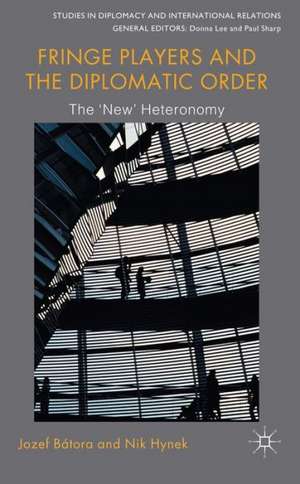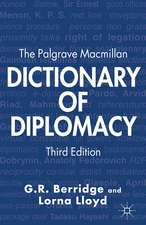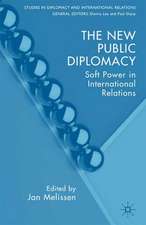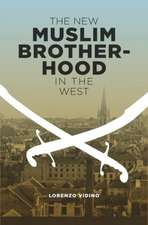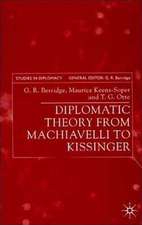Fringe Players and the Diplomatic Order: The 'New' Heteronomy: Studies in Diplomacy and International Relations
Autor Kenneth A. Loparoen Limba Engleză Hardback – 25 iul 2014
| Toate formatele și edițiile | Preț | Express |
|---|---|---|
| Paperback (1) | 567.64 lei 6-8 săpt. | |
| Palgrave Macmillan UK – 2014 | 567.64 lei 6-8 săpt. | |
| Hardback (1) | 630.09 lei 6-8 săpt. | |
| Palgrave Macmillan UK – 25 iul 2014 | 630.09 lei 6-8 săpt. |
Din seria Studies in Diplomacy and International Relations
- 18%
 Preț: 923.66 lei
Preț: 923.66 lei -
 Preț: 375.65 lei
Preț: 375.65 lei - 15%
 Preț: 623.11 lei
Preț: 623.11 lei - 18%
 Preț: 761.78 lei
Preț: 761.78 lei - 18%
 Preț: 926.14 lei
Preț: 926.14 lei -
 Preț: 378.83 lei
Preț: 378.83 lei - 18%
 Preț: 710.45 lei
Preț: 710.45 lei - 15%
 Preț: 629.45 lei
Preț: 629.45 lei -
 Preț: 383.74 lei
Preț: 383.74 lei - 15%
 Preț: 630.64 lei
Preț: 630.64 lei -
 Preț: 380.17 lei
Preț: 380.17 lei - 18%
 Preț: 982.42 lei
Preț: 982.42 lei -
 Preț: 383.53 lei
Preț: 383.53 lei -
 Preț: 377.34 lei
Preț: 377.34 lei - 15%
 Preț: 632.01 lei
Preț: 632.01 lei - 18%
 Preț: 1214.35 lei
Preț: 1214.35 lei -
 Preț: 380.17 lei
Preț: 380.17 lei - 15%
 Preț: 627.11 lei
Preț: 627.11 lei - 15%
 Preț: 631.05 lei
Preț: 631.05 lei -
 Preț: 379.79 lei
Preț: 379.79 lei - 18%
 Preț: 982.42 lei
Preț: 982.42 lei -
 Preț: 386.01 lei
Preț: 386.01 lei - 15%
 Preț: 629.52 lei
Preț: 629.52 lei - 15%
 Preț: 629.70 lei
Preț: 629.70 lei - 18%
 Preț: 1089.91 lei
Preț: 1089.91 lei -
 Preț: 378.63 lei
Preț: 378.63 lei -
 Preț: 382.22 lei
Preț: 382.22 lei - 18%
 Preț: 713.37 lei
Preț: 713.37 lei - 18%
 Preț: 873.89 lei
Preț: 873.89 lei - 18%
 Preț: 714.46 lei
Preț: 714.46 lei
Preț: 630.09 lei
Preț vechi: 741.29 lei
-15% Nou
Puncte Express: 945
Preț estimativ în valută:
120.63€ • 125.38$ • 100.01£
120.63€ • 125.38$ • 100.01£
Carte tipărită la comandă
Livrare economică 06-20 februarie 25
Preluare comenzi: 021 569.72.76
Specificații
ISBN-13: 9780230363939
ISBN-10: 0230363938
Pagini: 214
Ilustrații: VII, 214 p.
Dimensiuni: 140 x 216 x 20 mm
Greutate: 0.43 kg
Ediția:2014
Editura: Palgrave Macmillan UK
Colecția Palgrave Macmillan
Seria Studies in Diplomacy and International Relations
Locul publicării:London, United Kingdom
ISBN-10: 0230363938
Pagini: 214
Ilustrații: VII, 214 p.
Dimensiuni: 140 x 216 x 20 mm
Greutate: 0.43 kg
Ediția:2014
Editura: Palgrave Macmillan UK
Colecția Palgrave Macmillan
Seria Studies in Diplomacy and International Relations
Locul publicării:London, United Kingdom
Cuprins
Introduction 1. Social Scientific Conceptualizations of Diplomacy 2. Diplomacy as an Institution Embedded in Environments, Structures and Practices 3. Studying Liminality and Fringe Players in the Modern Diplomatic Order 4. The Holy See: Global Borderless Sovereignty and Double-Hatted Diplomats 5. The Sovereign Military Order of Malta: Extraordinary Resilience Meets the Chance 6. The European Union: Bending the Rules to Fit In 7. Conclusion - Liminality, Co-Existing Diplomatic Orders and the 'New' Diplomatic Heteronomy
Recenzii
"This study of the nature and dynamics of the modern diplomatic order makes several surprising and interesting moves. Analytically by combining such strange bed-fellows as organization theory, oriented institutionalism and Eisenstadt's research program on comparative liminality, and empirically by focusing on three fringe players, a newcomer (the European Union) and two old enities (the Holy See and the Sovereign Military Order of Malta). The result [provides] new insights into diplomacy as an institutionalized, composite order, the interdependence between continuity and change, as well as the role of institutions in political life." - Johan P. Olsen, University of Oslo, Norway
"This bringing of neo-institutional theory to diplomacy is long overdue, and is the more commendable for relying on case-studies of how hegemonic set-ups are contested. Yet another step in the rapid professionalisation of diplomacy studies." - Iver B. Neumann, London School of Economics, UK
"This bringing of neo-institutional theory to diplomacy is long overdue, and is the more commendable for relying on case-studies of how hegemonic set-ups are contested. Yet another step in the rapid professionalisation of diplomacy studies." - Iver B. Neumann, London School of Economics, UK
Notă biografică
Jozef Bátora is Associate Professor, Director and Jean Monnet Chair at the Institute of European Studies and International Relations, Faculty of Social and Economic Sciences, Comenius University in Bratislava, Slovakia.
Nik Hynek is Associate Professor at the Metropolitan University Prague, Comenius University in Bratislava and Charles University in Prague, Czech Republic.
Nik Hynek is Associate Professor at the Metropolitan University Prague, Comenius University in Bratislava and Charles University in Prague, Czech Republic.
